Jet-Set and Learn: Summer Travels Transform Student Perspectives
Story by:
Published Date
Article Content
This summer, the world became a classroom for hundreds of Tritons who ventured out of their comfort zones, immersed themselves in unfamiliar cultures, served the communities around them and opened their minds to new ideas and fresh possibilities for the future.
From islands in the Caribbean to Europe, Asia and beyond, UC San Diego’s Global Seminars (GS) offer students the opportunity to earn academic credits while learning from the university’s outstanding faculty in a unique environment. With the goal of inspiring students to become more globally aware and gain the confidence to pursue their long-term personal, academic and career goals, the program implements educational excursions, guest lectures, field work and community service, allowing students to make the most of their international experience.

Summer 2023 was a record year for GS, with 396 students participating in 20 programs around the world. Next summer, the program—which is part of the university’s Global Initiatives—will expand its offerings with 27 offerings, including its first-ever Spanish intensive language program in Spain; an eight-week internship program in Ireland; a biology research program in the Galapagos Islands and more.
For students interested in exploring social justice topics and learning through service work, the university’s Alternative Breaks program offers a range of both national and international service and learning trips held over the winter, spring and summer breaks. The yearlong program brings participants together weekly to learn about the communities they’ll be working with, as well as their trip’s specific social justice topic—with offerings that range from disaster relief and racial environmental justice to green building and sustainability.
This summer, a cohort of Tritons headed for Southeast Asia, where they spent two weeks in Bali, Indonesia for a holistic and public health-focused Alternative Break. There, they learned from local community leaders, assisted with preventative health check-ups and delivered health education workshops for local youth.
As they return to campus for the start of a new academic year, UC San Diego students who participated in these dynamic programs are bringing back with them an expanded worldview and a desire to make a positive impact in their own communities and future careers.
“Global Initiatives at UC San Diego is committed to providing access to global learning opportunities for all students. Global Seminars, in particular, opens doors to diverse perspectives, promotes cultural understanding and equips our students with invaluable skills for an interconnected world,” said Tamara T. Cunningham, assistant vice chancellor for Global Initiatives. “I applaud the dedicated faculty and team whose unwavering commitments enable these transformative international experiences.”
Meet a few of the many undergraduate students who participated in Global Seminars and the Alternative Break this summer and learn how the experience shaped them personally.
These interviews have been edited for length and clarity.
A passion for community
For sociology major Melody Cervantes, a transfer student entering her second and final year at UC San Diego this fall, a Global Seminar entitled “People, Power and Politics in Puerto Rico” taught by associate professor of sociology Vanesa Ribas, proved to be a life-changing experience. The Muir College student returned from the vibrant city of San Juan to her San Diego community of Barrio Logan determined to make a difference in the lives of those around her.
What interested you about the Global Seminar in Puerto Rico?
I’ve been working a lot since I started college, and figured it was time to try something new. I want to learn more about politics, especially in other regions, and Puerto Rico is intriguing because of its history of colonization and status as a U.S. territory. Growing up, I never learned about Puerto Rico even though it’s part of the United States. That’s why I wanted to take the class, and I wanted the opportunity to take it over there because it’s more of a personal and immersive experience.
What was the highlight of the trip for you personally?
We had the opportunity to do a kayak tour and learn about how important mangroves are to the local communities—as well as to visit the El Yunque Rainforest and an indigenous site called Centro Ceremonial Indigena, where we learned about Taíno history. During excursions, we also got to talk to people about their personal experiences with displacement issues in Puerto Rico and the continued fight of historically Afro-descendant communities to have their people stay in the areas they come from. The community of Loíza is one that we went to frequently, and it was there that we met a community organizer named Marcos. He really stood out to me because he does so much work on multiple projects for his community, including with nonprofit Corporación Piñones Se Integra (COPI), and he is also an artisan who creates the vejigante masks that the community is known for. He always seems so happy and welcoming of others to his community.
How did the experience impact you?
Talking to Marcos and other community organizers, I was really inspired to come back to my neighborhood, Barrio Logan, and immerse myself even more. I left feeling very inspired, realizing that if they could do it, I could do it too—it just takes a lot of motivation and passion. I’ve been trying to go to more events at Chicano Park after work, help clean my neighborhood and do small things to involve myself in my community more. If you have enough passion for it, you can do anything.
What advice do you have for students who might be interested in participating in a Global Seminar next summer?
Don’t be afraid and just do it. I’m very introverted and I get anxious about leaving home, but it’s so worth it to meet people from the other side of the world. You never know what you’ll take from it. Don’t be afraid to ask questions and really immerse yourself—it’s a completely different experience.
A new perspective on the world
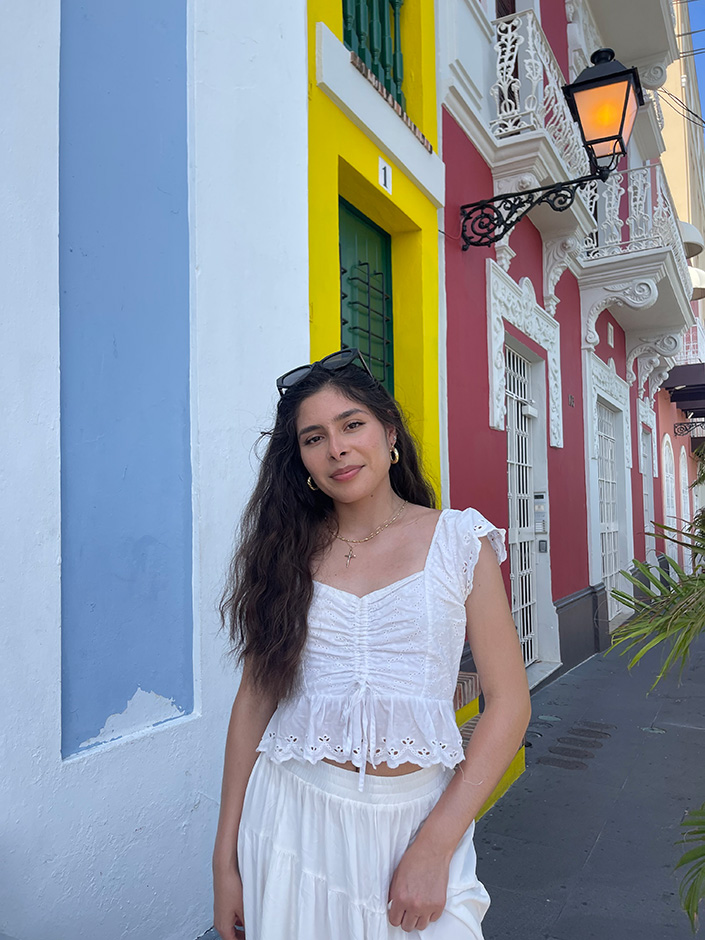
Alex Ross, a second-year student in Eleanor Roosevelt College (ERC) majoring in political science and international relations, chose to attend a Global Seminar in Granada, Spain, this summer. “Spanish Memories, African Hopes Through Literature & Film,” taught by professor of French and comparative literature Nina Zhiri, gave Ross the opportunity to fulfill some of ERC’s “Making of the Modern World” interdisciplinary general education requirements, but also gave him the opportunity to broaden his worldview as he works toward a career in diplomacy.
What interested you about the Global Seminar in Spain?
I was looking for a study abroad opportunity, but I didn’t think I’d be able to commit to a full semester, so that’s what made Global Seminars an attractive option for me. I thought it would be interesting to learn about immigration between Spain and Africa, and I saw that we would have the opportunity to go to Morocco for a weekend, and I had never been to Africa before.
What was the highlight of the trip for you personally?
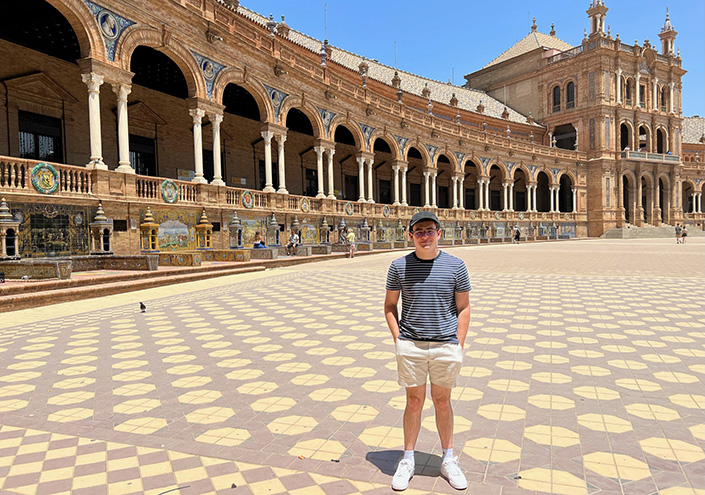
Morocco felt like a completely new world to experience. We had the opportunity to have lunch and spend an afternoon with a host family. It was amazing to see how they live their lives and to learn about their perspectives, their culture and food. Professor Zhiri was raised in Morocco, so she had a unique ability to teach the course through her perspective. Another favorite experience was another weekend trip from Granada to Madrid. We really bonded as a group with lots of time spent on the bus together.
How did the experience impact you?
Because of my interest in international relations, being able to travel back and forth between Spain and Africa through the Strait of Gibraltar—which is a dangerous passage where a lot of immigrants embark on journeys to create a better life for themselves and their families—was eye-opening and saddening. We were able to hear directly from immigrants who made the journey and how it impacted their lives personally. For our literature and film class, we read and watched a lot of material on the experience of immigrants traveling from Africa to Spain. The issues surrounding African migration are not effectively addressed in government and are not reported on in the United States, so I am thankful I was made aware of these pressing issues. We were also in the country during Spain’s election season, so it was interesting to learn more about Spain’s system of government.
What advice do you have for other students who might be interested in participating in a Global Seminar next summer?
It’s always good to get outside of your comfort zone and experience something you wouldn’t otherwise experience. I think it’s important to have international experience, even if it’s just for a short time, because it really immerses you into another part of the world where things are happening that we don’t always hear about in the United States. I think that going through culture shock and learning about ways different people around the world live is really valuable.
A change of pace
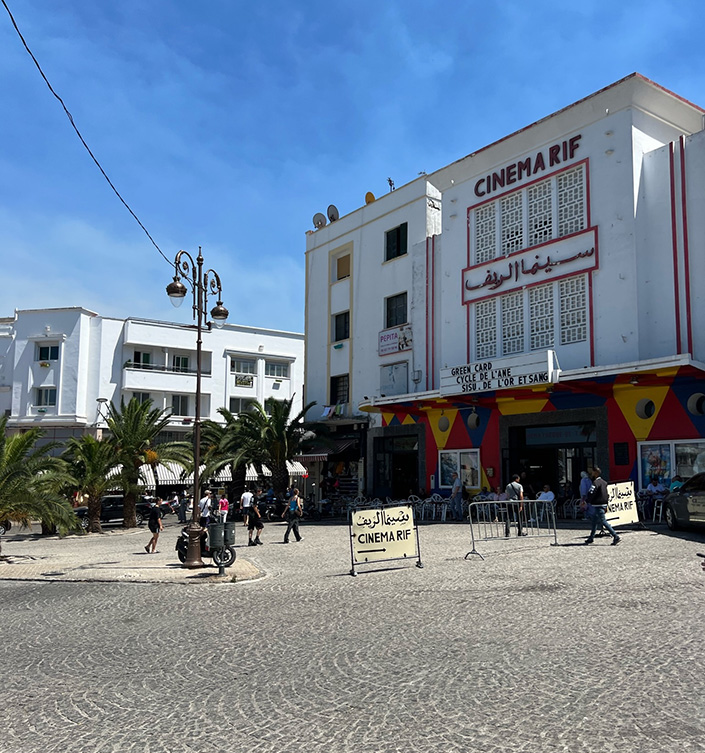
“Psychiatry in Central Europe,” a Global Seminar in Vienna, Austria, taught by Stephan Anagnostaras, an associate professor of psychology, attracted Emma Luppi, who is entering her second year at UC San Diego this fall. The Revelle College student, who is majoring in cognitive and behavioral neuroscience with a minor in psychology, gained a deeper understanding of the field of psychiatry as well as increased clarity about her future goals and aspirations.
What interested you about the Global Seminar in Austria?
Since I’m on a pre-med track, I wasn’t sure if I was going to be able to have a study-abroad experience, so having the option of attending a Global Seminar in the summer was a great opportunity for me. One of the courses offered was about drugs and behavior, which covers a variety of different drugs, their background, how they’re made and how they affect the body in the behavioral and cognitive sense. The other covered the history of psychiatry, which was based mainly on the excursions and the historical aspects of our study abroad experience.
What was the highlight of the trip for you personally?
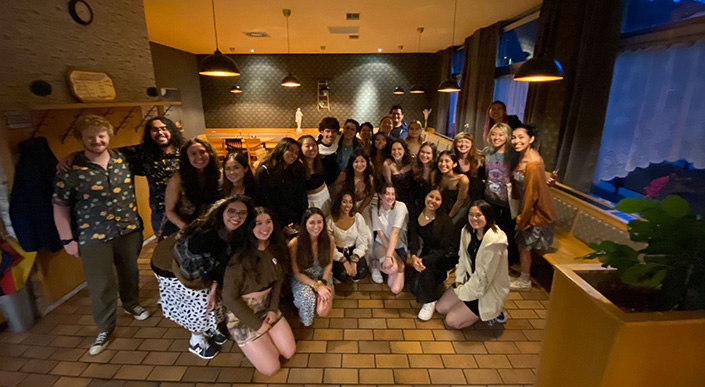
I loved the excursions to cultural sites in Vienna—museums, castles and more—but especially visits that were concentrated specifically on psychiatry. We visited medical museums, an abortion museum and a university exhibition that had artifacts used in hospitals centuries ago. Vienna has been one of the hot spots for psychiatry for a long time. One of the first asylums in Europe is located in Vienna, and it’s also where Sigmund Freud, the father of psychoanalysis, lived, studied and worked. We got to visit his house and studio, which was really cool. We had the opportunity to meet people from Vienna, who were super friendly and showed us around places that we would have never found on our own. We also spent a week in Italy, took a trip to Salzburg, which was so picturesque, and I was able to visit Paris and Amsterdam on the weekends.
How did the experience impact you?
I definitely gained a deeper understanding and generally more knowledge about psychiatry, which is the specialty I hope to go into one day. There were several older students on the trip, and it was helpful to hear their advice, ranging from how to study for the MCAT, whether to take a gap year and what classes to take.
What advice do you have for other students who might be interested in participating in a Global Seminar next summer?
Go for it—it’s such a cool experience and you learn so much in so many ways. Whether it’s meeting new people, even starting to learn the language of the country you’re staying in, and just continuing your academic career. It was a nice change of pace for me. Being in a different environment invites you to learn and being in a new place made me feel refreshed.
A call to action
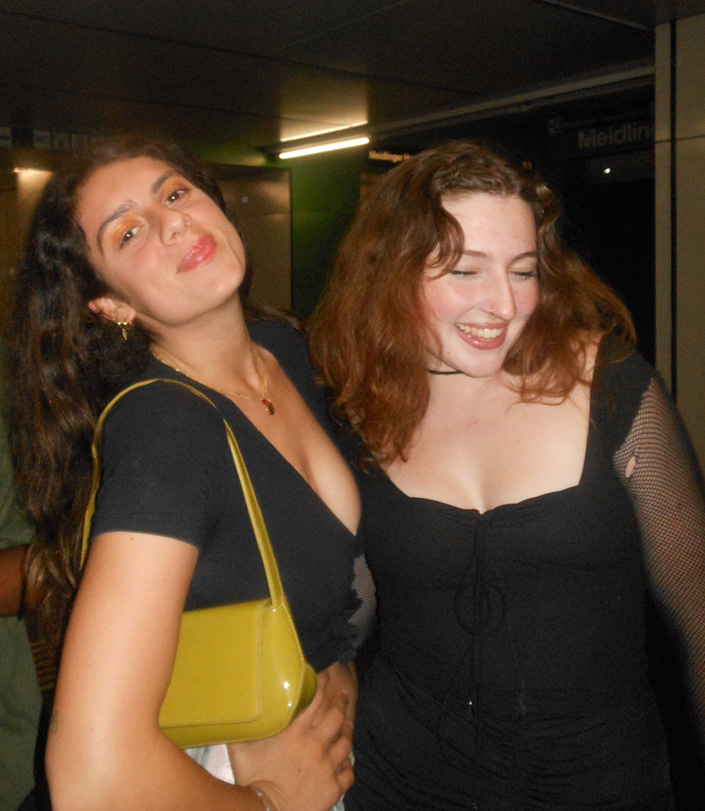
An Alternative Break trip to Bali, Indonesia, which focused on holistic and public health, offered an opportunity for fourth-year student Melody Gonzalez to travel outside of the United States for the very first time. A psychology major in Muir College, Gonzalez is back in San Diego looking for ways to support food sustainability and reduce hunger in her local community and beyond.
What did your work in Bali entail?
We volunteered with a local nursing program, so we went with students to different compounds where we assisted with medical exams, checking people’s height, blood pressure and weight and asking health questions. We also visited a medical center for pregnant women, where we met Robin Lim, a midwife and founder of Bumi Sehat, a nonprofit organization that offers free prenatal care and birthing services in Indonesia. Her story is so amazing, and she’s an incredible person. During the second part of the trip, we worked with kids at a local community center doing health education workshops. We would plan lessons for the day and play with the kids. This was very beneficial for me because I hope to work with children through a career in social work or another related field.
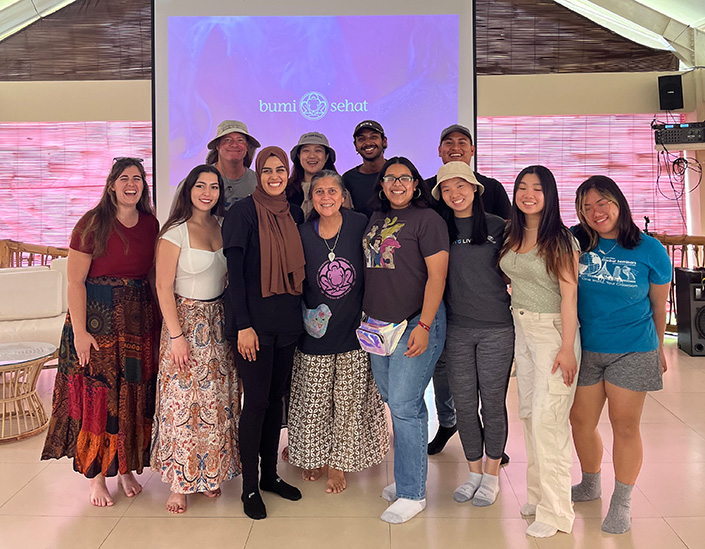
What was the most impactful part of the Alternative Break for you?
We partnered with an organization called Scholars of Sustenance, which is a global food rescue foundation focused on reducing food waste by rescuing and serving surplus food to communities in need. We helped make food, but we also went with the organizers to deliver it to a compound at the local dump. It was really intense and it really hurt being there—the reality of seeing where these people live was a lot. But I’m so grateful that we were actually able to go because it was very eye-opening. Hunger is a global problem that needs to be fixed.
Since you’ve returned to San Diego, how have you viewed the world differently?
When I came back home, I started looking into how to start a nonprofit and what nonprofits out there help with food sustainability. I need to get involved somehow, some way.
What advice do you have for students who are interested in Alternative Breaks?
This was my first time traveling out of the country. Even if it’s scary, do it. What you will get out of it is more than you expect, especially if you go in with the mentality that this is not a vacation—it’s a learning experience. The UC San Diego campus is diverse, but when you go out into the world it helps open your eyes and you gain new perspectives.
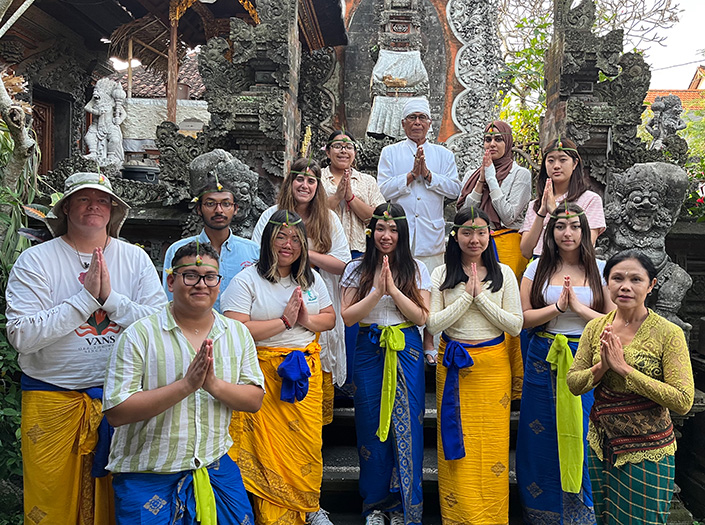
Share This:
You May Also Like
Stay in the Know
Keep up with all the latest from UC San Diego. Subscribe to the newsletter today.




